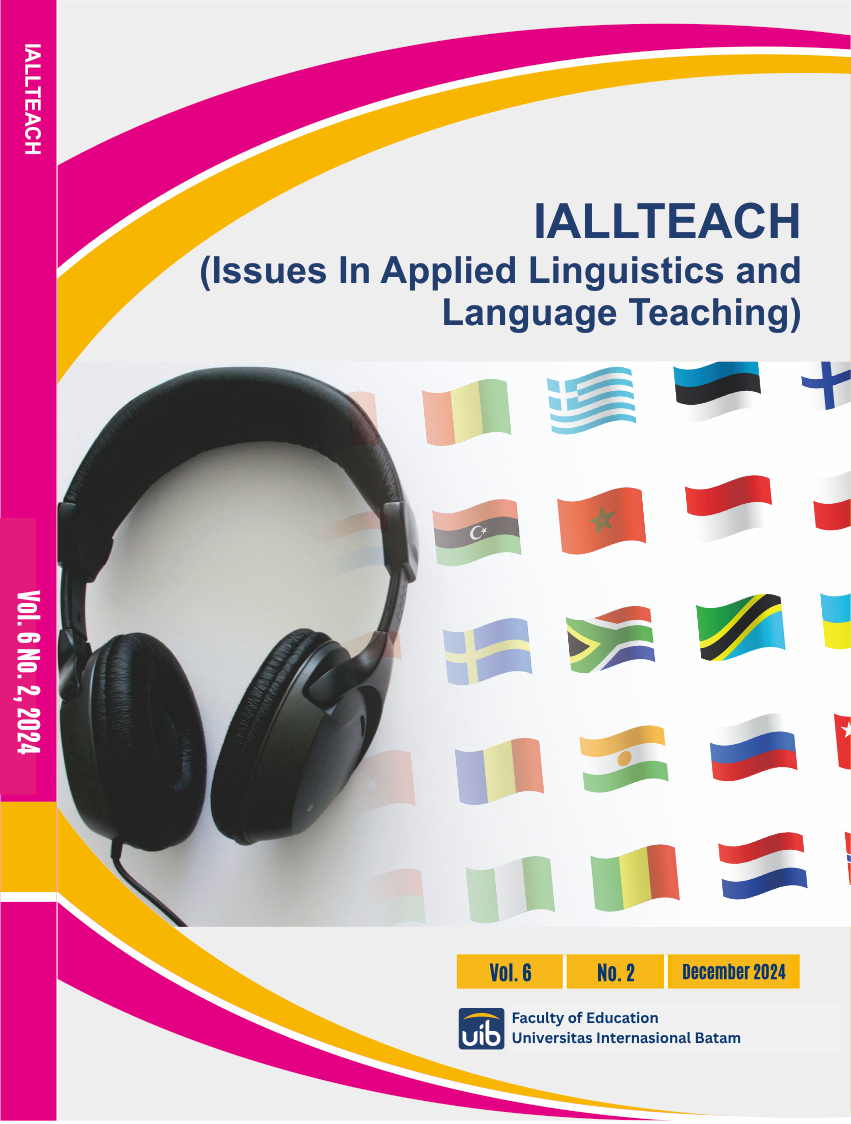Learning English Vocabulary Strategies for Non-English Department Students at Intensive English Class
DOI:
https://doi.org/10.37253/iallteach.v6i1.9669Keywords:
English Vocabulary Learning Strategies, Intensive English Class, non-English Department StudentsAbstract
This study aims to identify English vocabulary learning strategies used by non-English major students in the Intensive English Class (IEC) program, as well as explore the difficulties they face in the learning process. Using a qualitative case study approach, this research involved four students and four IEC tutors at a private university in Barito Kuala, South Kalimantan. Data were collected through classroom observations and in-depth interviews. The results of this study reveal that students use various strategies to learn vocabulary, namely recording new vocabulary along with its meaning and example sentences, memorizing by repeating, watching movies, or listening to English music, using online dictionaries or translator applications and asking directly to tutors or classmates. The strategy most often used by students is to record new vocabulary along with its meaning and example sentences, then the least used is asking directly to tutors or classmates. The main difficulties faced by students are lack of motivation and interest, as well as difficulties in understanding and applying vocabulary in various contexts, especially related to changes in word forms in sentences. The implication of the research is that students can increase their motivation in vocabulary acquisition through fun learning activities. Furthermore, teachers are also expected to be more creative, innovative, and give appreciation to students so as to create a pleasant learning atmosphere.
Downloads
References
Adam, S., & Magfirah, S. (2022). Vocabulary Strategies for English Learners. Els Journal on Interdisciplinary Studies in Humanities, 5(3), 563–572. Https://Doi.Org/10.34050/Elsjish.V5i3.23164
Afidah, Ul, Imam Machfudi, M., & Haji Achmad Siddiq Jember, K. (2022). Uin Kyai Haji Achmad Siddiq Jember Students’ Difficulties in Vocabulary Mastery. 1(1). Https://Doi.Org/10.35719/Crewjourna
Dakhi, S., & Fitria, T. N. (2019). The Principles and The Teaching of English Vocabulary: A Review Tira Nur Fitria. Journal Of English Teaching, 5(1).
Duong, T. M., Tran, T. Q., & Nguyen, T. T. P. (2021). Non-English Majored Students’ Use of English Vocabulary Learning Strategies with Technology-Enhanced Language Learning Tools. Asian Journal of University Education, 17(4), 455–463. Https://Doi.Org/10.24191/Ajue.V17i4.16252
Elmahdi, O. E. H., & Hezam, A. M. M. (2020). Challenges For Methods of Teaching English Vocabulary to Non-Native Students. Advances in Social Sciences Research Journal, 7(5), 556–575. Https://Doi.Org/10.14738/Assrj.75.8263
Ghalebi, R., Sadighi, F., & Bagheri, M. S. (2020). Vocabulary Learning Strategies: A Comparative Study of EFL Learners. Cogent Psychology, 7(1). Https://Doi.Org/10.1080/23311908.2020.1824306
Holifah, H., & Kurniasih, K. (2021). Non-EFL Students Vocabulary Learning Strategies Holifah 1). English Language in Focus (Elif), 4(1), 51–60. Https://Doi.Org/10.24853/Elif.4.1.51-60
Iftanti, E., & Maunah, B. (2021). Belief, Perception, And Challenges of English Department Students to Learn English in Globalization Era. Indonesian EFL Journal, 7(1), 1–12. Https://Doi.Org/10.25134/Ieflj.V7i1.3985
Iiyosovna, N. A. (2020). The Importance of English Language. International Journal on Orange Technologies, 2(1), 22–24. Www.Researchparks.Org
Li, L. (2022). A Discussion of The Application of Context Theory in English Vocabulary Teaching. Academic Journal of Humanities & Social Sciences, 5(16), 8–13. Https://Doi.Org/10.25236/Ajhss.2022.051602
Lismay, L., & Zubaidah. (2019). Strategi Pembelajaran Bahasa Inggris Mahasiswa Mahad Iain Bukittinggi. Journal Educative: Journal of Educational Studies, 4(1), 45.
Lutfiyah, N., & Nuraeningsih, R. (2022). The Obstacles in Learning Vocabulary of EFL Students. Prominent: Journal of English Studies, 5(2), P-Issn.
Murtiningsih, T. (2020). Utilizing Online Learning to Enhance English Skills on Intensive English Class. International Journal of Educational Best Practices (IJEBP), 4(2). Https://Doi.Org/10.32581/Ijebp.V4n2.P48-59
Nadia, H., & Aditama, M. J. (2018). The Effect of Intensive English Class on Students’ Language Skill (Vol. 1, Issue 1). Https://Journal.Umbjm.Ac.Id/Index.Php/Tefla
Schmitt, N. (2019). Understanding Vocabulary Acquisition, Instruction, and Assessment: A Research Agenda.
Takac, V. P. (2008). Vocabulary Learning Strategies and Foreign Language Acquisition. Http://Www.Multilingual-Matters.Com
Wulandari, A., Alaydrus, Y., & Ni’mah, D. (2020). A Study on The Learning Vocabulary Difficulties and Strategies Used By High Achievers Of The Seventh Grade Students of SMP. 26, 15.




.png)






